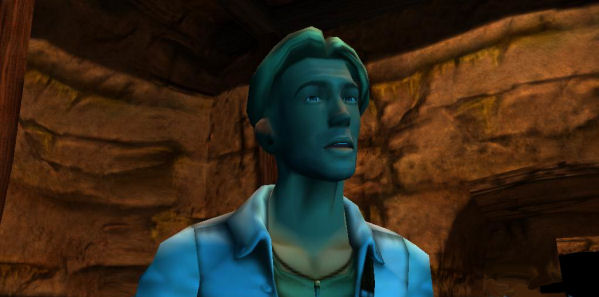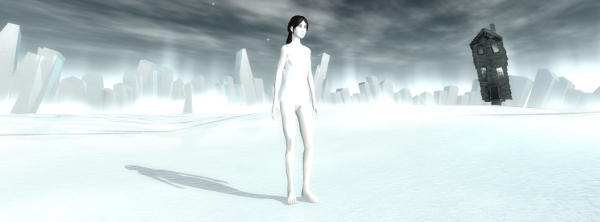Having A Good Cry
I'm teased for a number of things. Whether it's Kieron's most backhanded, "The Funny One", or Kieron's calling me a bad healer, or Kieron... Wait, I'm teased by Kieron for a number of things. But perhaps the most common is to suggest that a game is likely to make me cry.
It's my own fault. I've written quite openly about it in the past. I brought it upon myself. But thinking back, I can only think of two occasions when a game has brought me to tears. I may be forgetting something, but as is so often the case with the things for which one is mocked, it's a pretty rare occurrence. I would much prefer it happened a lot more often.
I still deserve the mocking. I cry all the damn time at the most ridiculous things. Mostly TV shows. I recently saw Up at the cinema in the States and as well as snivelling all the way through, at one point let out the most extraordinary blub (the moment with the book, midway, people who've seen it), the person with me trying hard not to laugh out loud at me and instead calmly passing a tissue. Then after the film she laughed and laughed and laughed. I say this lest anyone who knows me thinks this is my attempt to claim to be anything other than a giant embarrassing crybaby. Games are simply a small part of this.
The two games that I can recall are Broken Sword: The Sleeping Dragon, and Dreamfall: The Longest Journey.
Broken Sword: The Sleeping Dragon
I've written about this game and crying before, so I can only summarise the moment here. It was a moment of extraordinary self-sacrifice in a thoroughly decent point-and-click adventure. Er, spoilers to come? George and Nico's friend Bruno sacrifices his own life so the two characters can escape a collapsing temple. A noble act like that is impressive, but not the sort of thing that tends to jerk my tears. Instead it was the moment between George and Nico immediately after, as George's face crumples as the reality sinks in, and Nico pushes aside her need to tease and just holds him. It was such an incredibly human moment, so honest, and while I didn't really care about Bruno (despite his having been a regular in the series of games), it turns out I did care about George, and even more, about seeing the reality of how close they were, long before the game's ending kiss.
Dreamfall: The Longest Journey
I've written enormous amounts about The Longest Journey, most recently (and I think finally successfully saying what I've been trying to say about it for a decade) in our Gaming Made Me series. But I've written far less about its sequel, Dreamfall. However, a lot of it was discussed in the enormo-interview I did with creator Ragnar Tørnquist. (I think the discussion about the role of the death of faith in the game makes for the best interview I've conducted.) Here I put quite a hefty warning of spoil if you've not played the game.
The moment of weeping was more about the death of Faith than the death of faith, but of course one was analogous for the other. Well, in fact, I cried twice during the game, both times over Faith's death from different angles. The first time is in the Russian laboratory, where you find the room in which Faith was imprisoned. This is a child, an eight year old child at the time of her death, incarcerated and experimented upon. You already know the horror of her existence, having refused death to the point where she's undoing reality. And now you see the awfulness of her life. It's cleverly done. The first time you go into her room you don't know what it is. Zoe, the main character, gives neutral descriptions of the crayon drawings on the walls, the small bed, the dollhouse. Confused, but neutral remarks. You then watch the security footage, realise what happened in there, and can go back in after. This time Zoe's descriptions are heart-tearing. This 20 year old is empathising with the dreadful plight of the small girl, and the horror of her life. And at the same time, this is the story of faith falling apart. Zoe's faith is being torn.
The second time comes at the very end. In The Winter, the reality Faith has built around herself in this non-existence, Zoe wanders in her TLJ-requisite underwear (I think the fragility this gives her justifies the decision), discovering the haunting full-scale version of Faith's dollshouse, insanely tearing open at the front (as a dollhouse does) to reveal the cross-section of the rooms inside. Inside is this eight year old girl, sat on the floor, crying. She's a terrified child, clinging on to a mockery of life. And Zoe's role, Zoe's reason for being dragged into this story, is to convince her to die. Here's Ragnar's words about that moment.
"Faith is clinging on to faith, because she’s clinging on to herself, and the concept of having faith that she’s still existing, while she’s obviously not existing. She’s dead, and she’s trapped inside the machines. That is destroying the world, but it’s also destroying this little girl. In order to save faith, you have to kill Faith. You have to destroy the past. Faith vanishes, and where she goes we never said. If that’s her spirit, then she goes to a better place. If that’s it, if you believe that’s the end, then it’s really kind of bleak. But it’s bleak in a way that has to be. You have to accept that transformation, and if that transformation is the end of everything, then that’s what you have to accept."
I reiterate both these examples because I want to once again bang the drum I spend so much of my life banging. Games can be this good. They can have moments this remarkable. It takes a lot of passion, and most of all, a lot of honesty. I think perhaps honesty is the commodity most missing from game stories, and when it appears it can be the most remarkably evocative and moving experience. Cecil's moment in Broken Sword was complete simplicity - two people who love each other putting aside their cat-and-mouse play acting for a moment of pure honesty, where they shared their love for each other when it was most needed. Tørnquist's moment in Dreamfall was the culmination of two beautiful games ending in not only the necessary and non-exploitative death of a child, but the deaths of characters' personal faiths. I have no issues at all with declaring that these moments brought me to tears. I'd be slightly concerned had they not.
I'm not asking for all games to make me cry. It would just get awkward and exhausting. But I am saying, game stories can do a great deal, and our expectations of them should be permanently very high.
Which raises the question: what specific moments of games have made you cry? Fess up, you'll only get mocked forever.




